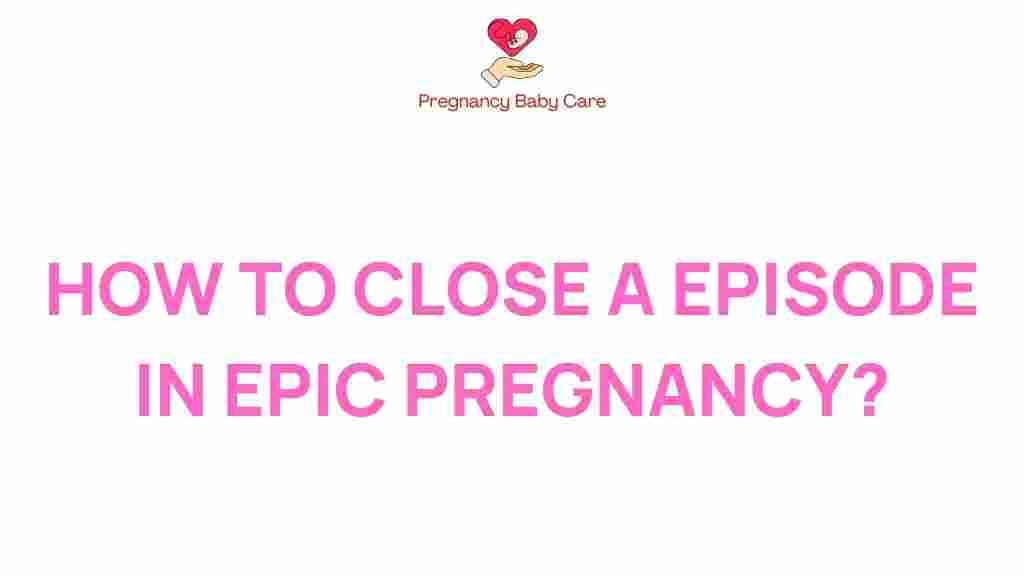How to Gracefully Conclude Your Epic Pregnancy Journey
As you approach the end of your pregnancy journey, it’s essential to focus on how to gracefully transition into the next exciting phase of your life—motherhood. Pregnancy is a beautiful experience filled with anticipation, joy, and sometimes anxiety. As you prepare for childbirth and the postpartum period, it’s crucial to prioritize your wellness, emotional health, and family bonding. In this article, we will explore various aspects of concluding your pregnancy journey, ensuring you feel supported and prepared for the adventure ahead.
Understanding the Journey Ahead
Each pregnancy is unique, but there are common themes and experiences that many women share. Understanding what lies ahead can help you navigate this journey with grace and confidence. Here are some key elements to consider:
- Maternity Care: Regular check-ups and communication with your healthcare provider are vital. They can guide you through the final weeks of pregnancy and prepare you for childbirth.
- Childbirth Preparation: Attend childbirth classes to equip yourself with knowledge about labor, delivery, and pain management techniques.
- Baby Preparation: Create a comfortable space for your newborn and gather essential items such as diapers, clothing, and feeding supplies.
- Emotional Health: Be mindful of your emotional well-being. It’s normal to experience a range of emotions as you prepare to become a mother.
- Family Bonding: Involve your partner and other family members in this journey to strengthen bonds and share responsibilities.
Step-by-Step Process to Conclude Your Pregnancy Journey
Gracefully concluding your pregnancy journey involves several steps that prepare you for childbirth and the postpartum phase. Here’s a comprehensive guide:
1. Finalize Your Birth Plan
Creating a birth plan helps you communicate your preferences for labor and delivery. Consider the following:
- Choose your preferred birth location (hospital, birthing center, or home).
- Discuss pain relief options (epidural, natural methods, etc.).
- Involve your partner in the planning to ensure mutual understanding.
2. Attend Prenatal Appointments
Stay consistent with your prenatal care. Regular check-ups enable your healthcare provider to monitor your pregnancy’s progress and address any concerns.
3. Prepare for Postpartum Recovery
The postpartum period is just as important as pregnancy. Prepare by:
- Creating a postpartum care kit, including items like pads, ice packs, and pain relievers.
- Arranging for help from family or friends during the early weeks after childbirth.
- Understanding the signs of postpartum depression and knowing when to seek professional help.
4. Focus on Wellness
Your physical and emotional health is crucial as you approach labor. Here are some tips:
- Practice relaxation techniques such as meditation or yoga.
- Maintain a balanced diet rich in nutrients to support your body.
- Stay hydrated and get adequate sleep as you prepare for the arrival of your baby.
5. Bond with Your Baby
Before the baby arrives, take time to bond with your unborn child. Talk, sing, or read to your baby to foster a connection.
6. Create a Support Network
Building a support network is essential for your emotional health. Connect with:
- Other expectant mothers through classes or online forums.
- Your partner, encouraging open communication about feelings and expectations.
- Healthcare professionals for guidance and reassurance.
Troubleshooting Common Concerns
Even with careful planning, challenges may arise during this transition. Here are some common issues and solutions:
1. Anxiety About Childbirth
It’s natural to feel anxious as your due date approaches. Combat these feelings by:
- Seeking support from friends or family who have experienced childbirth.
- Practicing breathing exercises and visualization techniques.
- Attending childbirth education classes for reassurance and knowledge.
2. Uncertainty About Postpartum Changes
Many women experience physical and emotional changes postpartum. To address this:
- Educate yourself about what to expect in the weeks following childbirth.
- Join a postpartum support group to share experiences and feelings.
- Consult with your healthcare provider about any concerns or symptoms.
3. Concerns About Family Dynamics
Adding a new member to your family can shift dynamics. To manage this transition:
- Communicate openly with your partner about roles and responsibilities.
- Involve older siblings in the baby preparation process to foster excitement.
- Schedule family bonding time to strengthen connections.
Conclusion: Embracing the New Chapter
As you conclude your epic pregnancy journey, remember that this transition is a significant milestone in your life. Embrace the changes that come with childbirth and postpartum recovery. Focus on your wellness, emotional health, and the importance of family bonding. By being prepared and informed, you can navigate this new chapter with confidence and grace.
For more resources on maternal care and wellness, consider visiting this comprehensive guide that provides valuable insights.
Remember, you are not alone in this journey. Lean on your support network, prioritize self-care, and enjoy the beautiful experience of welcoming your baby into the world.
This article is in the category Pregnancy and created by PregnancyBabyCare Team
